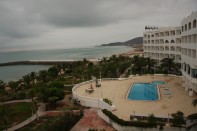
Tourism Investments, Mukalla hotel
By NY Staff
Civil conflicts in Yemen have led to the spread of darkness over all aspects of life, especially the economic sector. Unfortunately, the tourism sector is facing the hardest hit years ago before the Arab spring revolution kicked off in 2011.
For many years, tourism has been in recession. Before 2011, kidnapping and bombings targeting tourists led a decline. People were looking forward the situation improvement, but the situation has become increasingly worse. The damage to the tourism sector is great. Tourism investment has been affected by successive crises and tensions since the year 2011.
According to statistics issued by the General Authority for Investment (GIA), there has been a noticeable decline in the level of tourism investment from 2010 to 2014. The statistics confirmed the presence of a big disparity among the years 2011 2012- 2013- 2014 compared to 2010.
The number of registered tourism projects at the General Authority for Investment in 2010 was 33, then it declined gradually to 12 projects in 2011, 7 projects in 2012, raised to 9 projects in 2013, and fell to only 5 projects in 2014. The GIA recorded 972 tourism job opportunities in 2010, 271 opportunities in 2011, 155 opportunities in 2012, raising to 249 in 2013, and fell to 82 opportunities in 2014.
In general, the deterioration of tourism has affected various aspects of life. The General Manager of Investment at the Ministry of Tourism, Abu Mahdi Saleh, said that the decline in tourism has led to a worsening situation for a large segment of society who has lost their jobs.
“These losses started when capital stopped moving and purchase power decreased, making a number of workers lose their jobs and thus increasing unemployment, which resulted in negative social and economic effects,” Saleh stated.
In his working paper entitled “Tourism Investments”, Saleh explained that most tourism investments implemented were in the major cities because of the availability of basic services such as parks, restaurants, and hotels. There was one project for the tourism in Aden.
On other hand, Saleh mentioned a number of difficulties and problems for tourism investment in Yemen. He says that political unrest in Yemen since the beginning of 2011 led to a freeze in the tourism sector. “The security challenge, the weakness of the infrastructure services in remote areas, the development of targeted tourist sites, particularly beaches and islands, borrowing benefits, the problems of investment in lands, and the high cost of land without determining lands for the new tourism investments have all affected tourism,” Saleh added.
Tourism investment is linked to the movement of tourism, which both linked to the country’s situation in terms of security, stability and of the state’s interest in the development of tourism. The Undersecretary of the Tourism Ministry, Essam Alsnaini, said that the Ministry is still lacking the infrastructure destroyed in 2011 as a result of clashes.
“The security chaos is still a barrier to tourists who want to come to Yemen. Even the owners of tourism projects are exposed to blows as a result of this situation due to the duties and taxes imposed by the state, which has led them to lay off the workforce that finds themselves on the street,” Alsnaini added.
Alsnaini blames the political parties for the situation. He confirmed that the activation of domestic tourism is the main alternative for foreign tourism, but security organs should ensure security at tourist attractions and must find a common vision between the Ministry of Tourism, local councils, and the private sector to promote domestic tourism programs.



